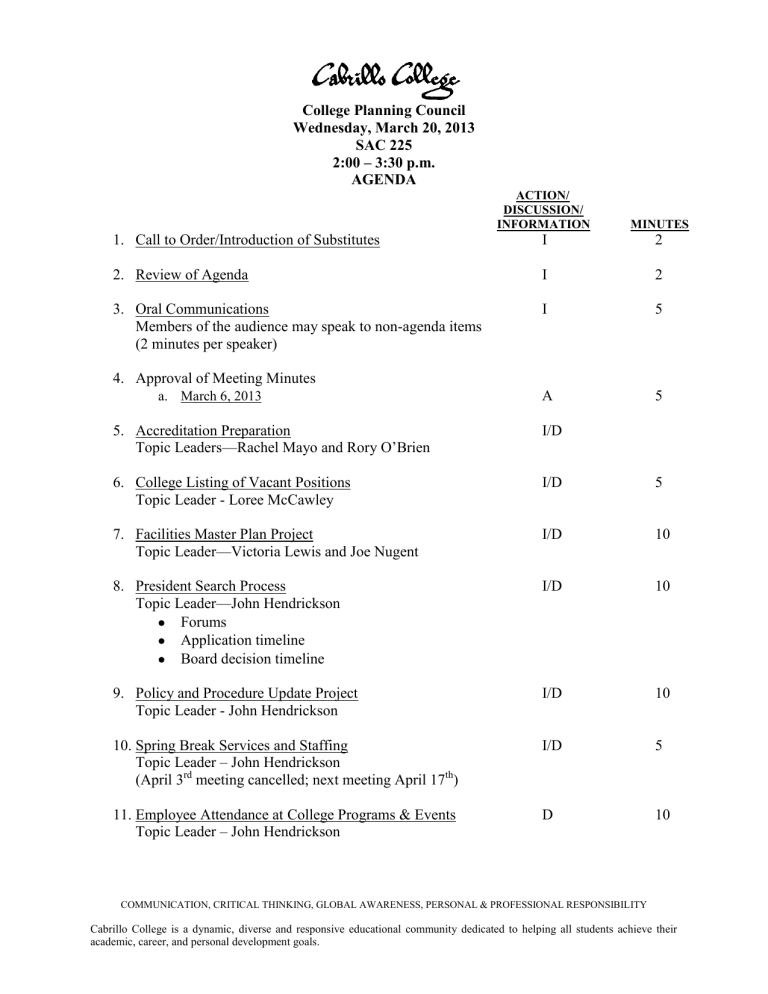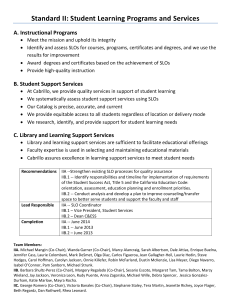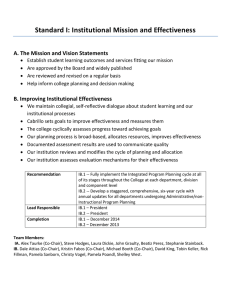College Planning Council Wednesday, March 20, 2013 SAC 225

College Planning Council
Wednesday, March 20, 2013
SAC 225
2:00 – 3:30 p.m.
AGENDA
1.
Call to Order/Introduction of Substitutes
ACTION/
DISCUSSION/
INFORMATION
I
MINUTES
2
2.
Review of Agenda I 2
3.
Oral Communications
Members of the audience may speak to non-agenda items
(2 minutes per speaker)
I 5
4.
Approval of Meeting Minutes a.
March 6, 2013 A 5
5.
Accreditation Preparation
Topic Leaders—Rachel Mayo and Rory O’Brien
6.
College Listing of Vacant Positions
Topic Leader - Loree McCawley
7.
Facilities Master Plan Project
Topic Leader—Victoria Lewis and Joe Nugent
8.
President Search Process
Topic Leader—John Hendrickson
Forums
Application timeline
Board decision timeline
9.
Policy and Procedure Update Project
Topic Leader - John Hendrickson
10.
Spring Break Services and Staffing
Topic Leader – John Hendrickson
(April 3 rd
meeting cancelled; next meeting April 17 th
)
11.
Employee Attendance at College Programs & Events
Topic Leader – John Hendrickson
I/D
I/D
I/D
I/D
I/D
I/D
D
5
10
10
10
5
10
COMMUNICATION, CRITICAL THINKING, GLOBAL AWARENESS, PERSONAL & PROFESSIONAL RESPONSIBILITY
Cabrillo College is a dynamic, diverse and responsive educational community dedicated to helping all students achieve their academic, career, and personal development goals.
CPC Agenda March 20, 2013 – continued
12.
Future CPC Meetings and Agenda items
May 6, 2013: Joint meeting with the Board of
Trustees on Student Success Initiative
Review of accreditation standards drafts
Budget planning
13.
CPC Meeting Schedule:
First and third Wednesdays at 2:00 except:
April 3, 2013—meeting cancelled due to spring break—next meeting 4/17/13 at 2:00
May 1, 2013 at 1:00 pm (Curriculum Committee)
14.
Adjourn
COMMUNICATION, CRITICAL THINKING, GLOBAL AWARENESS, PERSONAL & PROFESSIONAL RESPONSIBILITY
Cabrillo College is a dynamic, diverse and responsive educational community dedicated to helping all students achieve their academic, career, and personal development goals.
Standard I: Institutional Mission and Effectiveness
A. The Mission and Vision Statements
Establish student learning outcomes and services fitting our mission
Are approved by the Board and widely published
Are reviewed and revised on a regular basis
Help inform college planning and decision making
B. Improving Institutional Effectiveness
We maintain collegial, self-reflective dialogue about student learning and our institutional processes
Cabrillo sets goals to improve effectiveness and measures them
The college cyclically assesses progress toward achieving goals
Our planning process is broad-based, allocates resources, improves effectiveness
Documented assessment results are used to communicate quality
Our institution reviews and modifies the cycle of planning and allocation
Our institution assesses evaluation mechanisms for their effectiveness
Recommendation
Lead Responsible
Completion
IA -- Fully implement the Integrated Program Planning cycle at all of its stages throughout the College at each department, division and component level
IB -- Develop a staggered, comprehensive, six-year cycle with annual updates for all departments undergoing Administrative/non-Instructional
Program Planning
IA – President
IB -- President
IA -- December 2014
IB – December 2013
Team Members: IA. Alex Taurke (Co-Chair), Steve Hodges, Laura Dickie, John Graulty, Beatiz Perez, Stephanie Stainback.
IB.
Dale Attias (Co-Chair), Kristin Fabos (Co-Chair), Michael Booth (Co-Chair), David King, Tobin Keller, Rick Fillman,
Pamela Sandborn, Christy Vogel, Pamela Poandl, Shelley West.
Standard II: Student Learning Programs and Services
A. Instructional Programs
Meet the mission and uphold its integrity
Identify and assess SLOs for courses, programs, certificates and degrees, and we use the results for improvement
Award degrees and certificates based on the achievement of SLOs
Provide high-quality instruction
B. Student Support Services
At Cabrillo, we provide quality of student support services in support of student learning
We systematically assess student support service services using SLOs
Our Catalog is precise, accurate, and current
We provide equitable access to all students regardless of location or delivery mode
We research, identify, and provide support for student learning needs
C. Library and Learning Support Services
Library and learning support services are sufficient to facilitate educational offerings
Faculty expertise is used in selecting and maintaining educational materials
Cabrillo assures excellence in learning support services to meet student needs
Recommendations
Lead Responsible
Completion
IIA --Strengthen existing SLO processes for quality assurance
IIB.1 -- Develop a staggered, comprehensive, six-year cycle with annual updates for all departments undergoing Administrative/non-Instructional Program Planning
IIB.2 -- Conduct analysis and develop a plan to improve counseling/transfer space to better serve students and support the faculty and staff
IIA -- SLO Coordinator
IIB.1 – President
IIB.2 – Dean C&ESS
IIA -- June 2014
IIB.1 -- December 2013
IIB.2 – December 2014
Team Members: IIA.
Michael Mangin (Co-Chair), Wanda Garner (Co-Chair), Marcy Alancraig, Sarah Albertson, Dale
Attias, Enrique Buelna, Jennifer Cass, Laurie Colombani, Mark DeSmet, Olga Diaz, Carlos Figueroa, Jean Gallagher-Heil,
Laurie Hedin, Steve Hodges, Carol Hoffman, Carolyn Jackson, Onnie Killefer, Robin McFarland, Dustin McKenzie, Lisa
Meyer, Diego Navarro, Isabel O’Connor, Pam Sanborn, Michael Strunk. IIB.
Barbara Shultz-Perez (Co-Chair), Margery
Regalado (Co-Chair), Sesario Escoto, Margaret Tam, Tama Bolton, Marcy Wieland, Jay Jackson, Veronica Leon, Rudy
Puente, Anna Zagorska, Michael Wille, Debra Spencer, Jessica Gonzalez-Durham, Katie Marlow, Mayra Rocha.
IIC.
George Romero (Co-Chair), Victoria Banales (Co-Chair), Stephanie Staley, Tera Martin, Jeanette Richey, Joyce Flager,
Beth Regardz, Dan Rothwell, Rhea Leonard.
Standard III: Resources
A. Human Resources
Cabrillo employs qualified personnel to support programs and services
Faculty play a very important role in selecting faculty
All personnel are evaluated for improvement
Our college upholds written code of professional ethics
Cabrillo College works to maintain a sufficient number of full-time faculty, staff and administrators
Policies ensuring fairness in employment exist and are adhered to
B. Physical Resources
The college provides safe and sufficient physical resources
Physical resources are maintained in manner assuring quality
Cabrillo plans and evaluates its equipment and facilities
Physical resource planning is integrated with institutional planning
C. Technology Resources
Meet institutional teaching, learning, communication, and research needs
Enhance institutional operation/effectiveness
Infrastructure and equipment is properly maintained
Planning is integrated with institutional planning
D. Financial Resources
The College mission and long-range goals guide financial planning
Cabrillo’s financial plans assure stability and payment of future obligations
Guidelines and processes for financial planning and budget development are followed
We have sufficient cash flow and reserves
Our business office provides effective oversight of college finances
Financial resource planning is integrated with institutional planning
Team Members : IIIA.
Barbara Shingai (Co-Chair), Dave Reynolds (Co-Chair), Diane Goody, David Douglass, Sondra
Ricar, Alta Northcutt, Glenn Dixon, Becky Sulay. IIIB . Joe Nugent (Co-Chair), Gary Marcoccia (Co-Chair), David King, Binh
Cheung, Harry Bidleman. IIIC.
Dan Borges (Co-Chair), Francine Van Meter (Co-Chair), Wade Gil (Co-Chair), Ed Parrish,
Brad Krein, Dale Attias, Matt Escover, Barb Durland, Gerlinde Brady, Lena Mason, Marcelo Nogueira, Ray Rider,
Rosemary Brogan.
IIID.
Graciano Mendoza (Co-Chair), Ray Kaupp (Co-Chair), Terri Evans, Masina Hunnicutt
Standard IV: Leadership and Governance
A. Decision-Making Roles and Processes
Institutional leaders create a supportive and inclusive environment
We have ethical and effective leadership
Faculty, administrators, staff, and students have clearly defined roles in institutional governance at Cabrillo
Faculty, the curriculum committee and appropriate administrators are relied upon for recommendations on learning programs and services
All constituencies at the college work together for the good of the institution
The roles of leadership, governance and decision-making are evaluated regularly
B. Board and Administrative Organization
We have an effective Governing Board and President
The Governing Board acts as an independent, policy-making body, advocating for and supporting the institution
The Board has ultimate responsibility for educational quality, legal matters and finances
Our Board’s bylaws and policies are published
The Board is informed about, and involved in the accreditation process
The Board evaluates the President and delegates responsibility to him
The President assures institutional practices are consistent with mission and policies and guides institutional improvement
Recommendations IVB-- The Board will incorporate Accreditation standards into its annual self-evaluation
Lead Responsible IVB – Chair Governing Board
Completion IVB -- December 2014
Team Members : IVA.
James Weckler (Co-Chair), Sarah Doub (Co-Chair), Melinda Silverstein, Conrad Scott-Curtis,
Sandi Moore, Jason Camara, Phil Carr. IVB . Debora Bone (Co-Chair), Rachel Mayo (Co-Chair), Dominique Hansen, Lori
Amato, Cheri Barkey.
SLO Assessment and Program Planning at Cabrillo College
History of SLO Assessment
The Faculty Senate drafted the college core competencies, the Core 4 (2002-2003)
We designed an assessment process for Instruction (2003-2004)
An assessment plan was developed that divided Cabrillo into five sectors: Basic Skills and
Transfer, CTE, the Library, Student Services, and Administration (2003-2004)
We decided to consider General Education as one program (all departments that teach
Transfer and Basic Skills courses). The program SLOs for GE are the Core 4, which are also the SLOs for our AA and AS degrees
The Outcomes Assessment Review Committee (ARC) was established as a subcommittee of the Faculty Senate (2004-2005)
Non-instructional areas began developing assessment plans in 2006
Cabrillo is now at proficiency level and moving toward SQCI (Sustainable, Quality,
Continuous Improvement).
The Role of Outcome Assessment in Program Planning
SLO and AUO assessment is integrated into ongoing program planning (instructional and non-instructional), curriculum review and other college processes
Instructional departments assess all course and Certificate SLOs, and the Core 4 over a five-year period for every course, then write their program plan in the sixth year
ARC analyzes everyone’s yearly assessment data and prepares an annual report
SLO assessment analysis forms are turned in with each department’s annual update
Challenges and Solutions in SLO Assessment
Challenge
Adjunct Participation in SLO Assessment
Timely completion of SLO assessment
Providing an electronic tool for SLO Assessment
Reporting
Reporting of Assessment Results
Solution
A New Reporting Form and Program Chair training
New Tools and Individual Training to Help Program Chairs
Use of Google Docs or Cabrillo’s existing public drive
Pilot Project
AUO Assessment in Administration
Administration adopted use of Administrative Unit outcomes rather than SLOs (2012)
AUOs were part of 2012 Strategic Planning Process
All Administrative departments have created AUOs and are working to assess them

